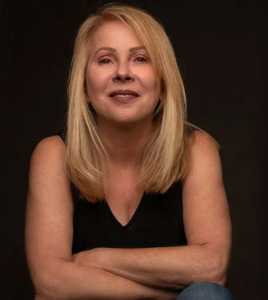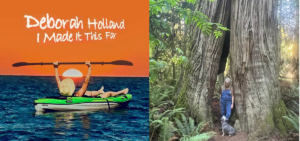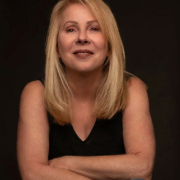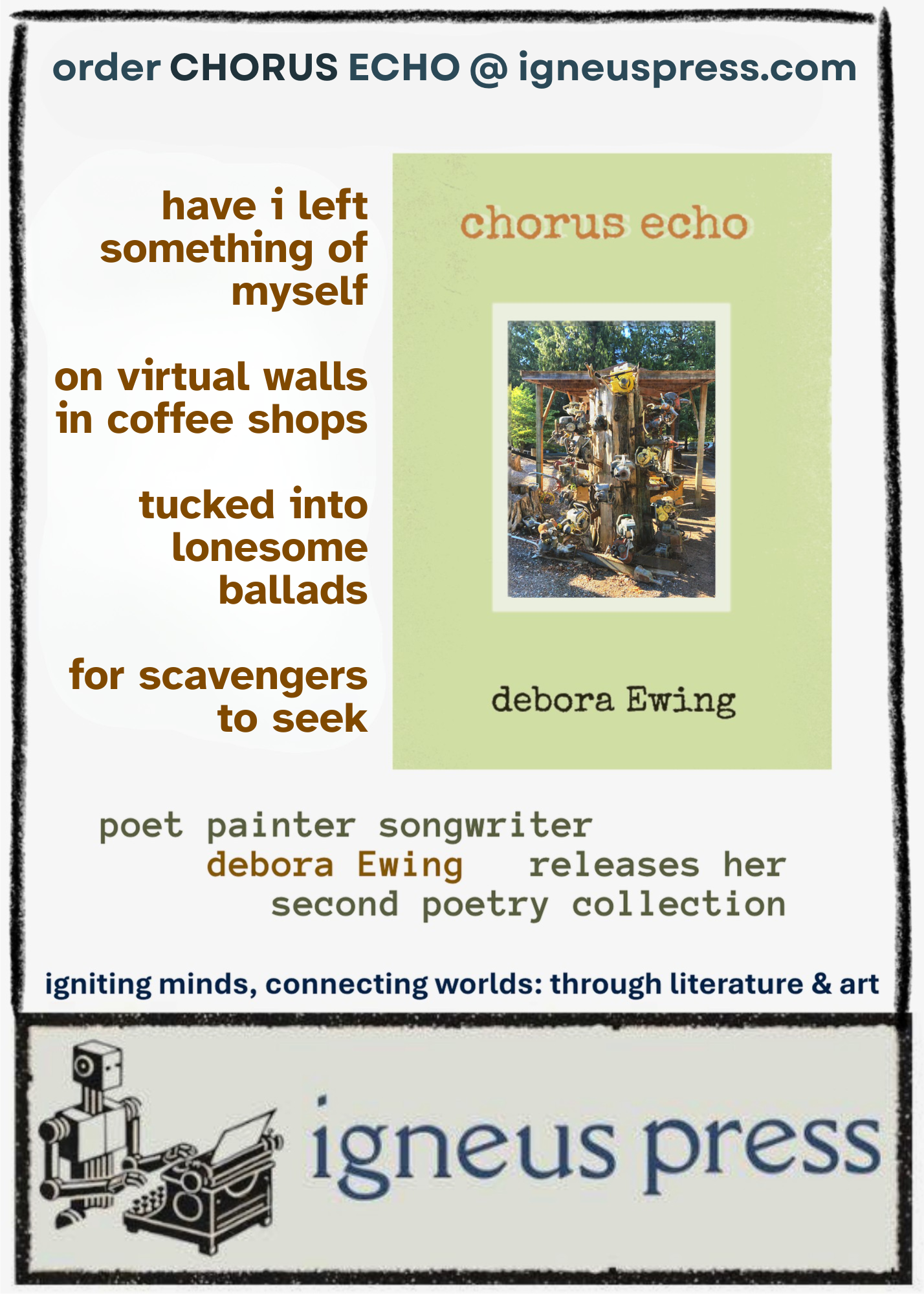Deborah Holland’s Made It This Far
...but let me tell you where she's been.

Deborah Holland‘s career to date spans decades, genres, and industries. She’s been a producer and a teacher; scored movies and toured in the U.S. and Canada – she also spans borders. Her song “I Want to Be a Canadian” is finding renewed relevance. And she did become a Canadian.
Holland has co-written and recorded with Dan Navarro; her band The Refugees is a collaboration with Wendy Waldman and Cidny Bullens. She’s also the front of another power trio: Animal Logic, with Stanley Clarke and Stewart Copeland. That band recently released singles: “Can You Tell Me” and “Ordinary.”
I intended to review Holland’s latest release, I Made It This Far. As I looked for details on her storied presence in Folk music, I found out I needed to ask her some questions.
We covered a wide range of topics: music scoring to higher education, the impact Canada’s had on her songwriting, as well as the stories behind some of the new songs – click here to read my full review of I Made It This Far.

Deborah Holland, I Made It This Far
me: I’m very much enjoying the new album. But I got digging around because that’s my job: to dig around. And I did get ahold of The Panic Is On, and that was so fun for me too, because I love old stuff. And so how did that come about?
DH: The Panic Is On was the record that kind of got me into the folk world, which I didn’t even know existed. Here’s the story: it was my master’s thesis.
me: Oh, wow. Cool.
DH: Yeah. After Animal Logic and my first solo album, which didn’t go anywhere, I decided to get out of the music business for the second or third or fourth time. And what do you do when you don’t know what to do with your life? You go back to school! So I went to get my master’s degree grade at Cal State LA in Commercial Music, which is basically popular music. When it came time to do my thesis, they said I could, instead of writing a 200-page paper, do some kind of a musical project and write a shorter paper. So of course, I chose that.
me: Of course!
DH: I’d always loved the song, “Buddy, Can You Spare a Dime?” I thought there must be other songs written around that period that discussed the Depression. I started researching and found all these songs, all different genres: a couple Blues ones, there’s some country, there’s some Tin Pan Alley type. And I decided the way I would tie them all together is by not using piano or guitar. So I don’t know if you noticed, but the record, all it is, is percussion, bass, and voice.
me: I did notice! And it was such a refreshing take. I wonder what other genres we could do this with?
DH: I decided to focus on the lyrics instead of the musical style. I think I spent a couple hundred bucks recording that. A friend of mine, Richard Goldman, who was on a little label out of Vermont called Gadfly, gave it to Mitch Kaplan, the owner of the label.
And he (Mitch) said, “I want to put this out.” And I thought, okay.
(Editor’s note: I freaking love this album. You can’t imagine the impact of this arrangement on these songs. Holland’s novel perspective brings them right up into the current day, and damned if we aren’t still living those stories. “I Am A Union Woman” is powerful, but as a Michigan girl it’s “Detroit Moan” that kicks me in the parts I’d rather protect. I highly recommend you listen to The Panic is On – available through Holland’s website here.)
DH: It (The Panic is On!) went into the folk DJ world, which of course brought me back into the music business, and led me to everything else. Kind of funny. That’s fun still, even though my music kind of, as you probably have noticed, crosses genres a lot.
me: In fact, I want to talk about that. In the ’90s I was living in Kalamazoo, Michigan, the former home of Gibson guitars and Checker Cabs. We had a musical household. I’d sit upstairs making art while the band was in the basement. I watched what we called B-movies (from Oxford English Dictionary: a low-budget movie, especially one made for use as a companion to the main attraction in a double feature.) Circuitry Man was one of my favorites.
DH: Oh my God.
me: …and part of why it was one of my favorites was the disparity of the futuristic scenario and the cowboy music. I just watched it again recently, since it came across my desk.
DH: I haven’t seen the movie since it was first released. I have a lot of songs in movies, and some of them I’ve never…I sang the closing theme song for a vampire movie: “Come to Me.”
me: Fright Night?
DH: Fright Night II. I don’t watch vampire movies. But the funny thing is: I have gotten more emails and comments about that song than anything, ever.
me: It’s a really good song.
DH: I didn’t write it. I just sang it. It was written by the composer Brad Fiedel. I’ll even get posts from Vampire Fan sites.
me: So when you were giving up music, what did you do instead?
DH: Well, it didn’t last long because that record, The Panic is On, kind of brought me back in. But I became a professor of music at Cal State L.A., basically running the Commercial Music department. And then I did another solo album. I got some money from teaching at Cal State; I got some kind of grant. So I made my second solo album, which is called The Book of Survival. And then I started touring on my own as a solo person. That got incredibly lonely and depressing because I would fly into a place, rent a car if the gig was good; there was no-one to share it with, and if the gig sucked I had nobody to commiserate with. That was kind of the impetus to form The Refugees, my trio with Wendy Waldman and Cidny Bullins. The Refugees have made records, and I’ve continued to make solo records as well.
me: I’ve noticed that music lends more to community, even at a nuclear level. You do it to do it with somebody else. I write lyrics and collaborate with musicians – I usually have a working melody, but I think they’ll come up with something better. I’ve learned over time – with art or with anything – that for me, better means something I didn’t think of. As soon as I thought of something, I’m done with that.
DH: I love collaborating. I mostly write by myself, but I enjoy great co-writing sessions, which I happen to have that kind of thing with Dan Navarro – we just wrote two new songs together.
me: Yeah, I heard! Cool. (please enjoy “These Ordinary Days” by D. Holland and D. Navarro, performed by Dan Navarro.)
DH: And with the Refugees and very few other people, I would say yes, the songs that come out of those co-writing sessions, I would not have written on my own. They’re on a different level. But that doesn’t happen very often. It’s rare. And The Refugee songs, it’s funny. Those are not songs that I would’ve written by myself, and they’re not even songs that I would perform by myself.
The Dan co-writes are different. Those are songs that, maybe because it’s only one other person, end up being more of me. I’ve never really thought about that. But yeah, they are songs that would not have written if I’d been by myself.
me: I have to enlist other people because I don’t play an instrument, and I’m refusing to learn, so I do a lot of art. But art seems by design to be solitary. You don’t really want somebody else getting involved. And I write poetry, and that feels like I’m writing to somebody else, but it’s always one other person. Like we’re having a conversation. Poetry is a conversation. Music, a song is just screaming: “Please connect me with somebody else.”
DH: And even more so when you play it live.
me: I’ve been in the room when other people perform songs we wrote together live and wow. That was something else.
DH: If I have a choice, I prefer not to play by myself. I have two gigs next month in the Seattle area that I can’t bring any musicians with me. But if I’m here where I live, or I’m in L.A., I don’t play by myself. Do you want to talk about the new album?
me: Let’s talk about the new album. I thought “A Long Time Ago” was a sweet and unique love song. It’s an absent friend story, and this is something that I’m really interested in: finding stories of different kinds of love. Because we have them – so many different variations – but we always end up with romantic songs: either “oh my God, so in love with you, and I don’t know what to do about it,” or “oh my God, so in love with you and you don’t like me,” and those seem to be the two kinds.
DH: Or “I’m so in love with you and you broke my heart.”
me: Yeah. I thought this song is a kind of a latent heartbreak because it’s saying: I love you, we love you, we miss you, and we understand you’ve made this decision, and we’re still here if you need us. No pressure.
DH: Yep. You’ve got the song. And I think there’s a little bit of anger there, too – anger or disappointment.
me: It’s like there’s an emotion we don’t have a word for yet that kind of combines those two…acquiescence. “Not trying to be a Savior” was one of the things I put in my notes. We’re not coming after you. I think we’ve all been that person at some point, too.
DH: I mean, I think the overriding emotion is sadness of that song.
me: Love is often sad. Yeah. And then next day, “I’m through with Love.” That song’s very country.
DH: Wait, “I’m through with Love.” – that’s a song from Animal Logic. That’s a really old song. That’s from 1989 from the Animal Logic record. Oh, wow. Oh, you know why you’re thinking of it? Because is it in Circuitry Man?
I knew it sounded familiar. No, I don’t really write about romantic love so much anymore. That’s not really a topic on my mind.
me: …but “Everybody’s Drinking…” I love that song so much, because that’s something – being up at 3 a.m. overthinking – that a lot of us go through. It’s not a love song, but it is. I’m used to hearing Dan Navarro perform it live.
DH: It’s funny. I had the title written down. I thought it was going to be an up-tempo, kind of country-ish, rocking, humorous song. And Dan had this other idea. I mean, it became something completely different. Did he depress the hell out of it? He did, didn’t he? I’ve been saying about writing with Dan, and I told him I say this, and he laughed: “When you co-write with Dan, the song ends up being more about him.”
me: I can picture him laughing at that. Yeah. But I wish that song would get more airplay. I think a lot of people would appreciate it. And the one I’ve been pushing on social media is also not on the new album, but I think a lot of people can commiserate with that right now: “I Want to Be a Canadian.”
DH: That’s having a resurgence. I see that popping up on playlists again.
me: I bet. But “September, the saddest month of the year” – currently, that’s my favorite. “The cold and I /We don’t agree.” To me, it had a real Motown feel. That’s the track I probably listened to the most on your new album.
DH: Oh, interesting. I’m glad to hear that. I had to explain to somebody just the other night…she was saying, “Well, September, that’s not the saddest month of the year.” I said, “No, no, no. You don’t get it. September’s not that bad a month. What it implies is that winter is coming.” I thought it was obvious from the song. I mean, September’s a fine month. It’s not bad yet, but it’s what’s coming.
me: Well, I grew up in Michigan. I hate it there. So yeah, to me it was obvious, and I was commiserating. October in Michigan is iffy, because it can be beautiful if the leaves are still falling in colors, but it might snow. We went trick or treating in our winter coats more than once.
DH: And it’s the end of summer; that was my point. 2010 is when I first moved to Canada, and since I’ve lived here, I want to say three quarters of every song I’ve written is about the weather. It’s in all my songs. I lived in LA for 33 years; there’s no weather there.
me: I want to know, going back to “September…” I love the arrangement. Is that a real Hammond, do you know?
DH: Not a real Hammond, but a Leslie-type speaker, and as close as you could get to a real Hammond, yeah.
me: That really helped give it the Motown feel.
DH: If I was really rich and I’d had the money, I would’ve put horns on that song.
me: That would have been awesome!
I have one question I got from someone else when I said I’d be talking to you. They want to know: What’s it like to work with Stewart Copeland?
DH: I knew that was coming. Just Stewart…not “What was it like to work with Stewart and Stanley?”
me: That’s the way it was put to me.
DH: It was amazing. I mean, that was my first time getting out of the music business.
me: How did that happen?
DH: I’d been living in L.A. for ten years and nothing was happening. I decided I’m getting out of the music business, and I’m going to go back to writing songs for me, the way I like to write songs. So I sat down and wrote two songs, “Spy in The House of Love” and “Firing Up The Sunset Gun.” And I made just a little four-track funky demo and gave them to a publisher that I knew, Dan Howell, who used to work at Criterion. Stewart and Stanley wanted to put together a band, and they didn’t want a guy; they didn’t want comparisons to Sting. And so they were soliciting demo tapes of women. And mine got passed to Stewart, and I got a call asking if I’d want to go audition for the band. And three weeks later I was in Brazil singing in front of 8,000 people.
me: nice!
DH: I mean, Stewart, he’s a very interesting, he’s super intelligent. I don’t want to say he’s not your typical drummer. He’s a very unique person and extremely talented, extremely musical. It was daunting. I was so green and naïve, and I was thrown into a situation that I was completely unprepared for. I would say, not until the second album did I start to feel like I had confidence and could say anything. It took a while. But I feel incredibly lucky. It was great. It was amazing. And at times awful.
me: I don’t think you’re not getting the full experience if you don’t get an awful.
DH: …because I was young and naïve, but mostly it was really great. Recently, we were going to make a new record. I went to L.A. and the three of us got together and started recording, and then Covid happened. It never got finished, but I took two of the songs that were almost done and finished them. And not last year, but the year before, actually, Animal Logic released two brand new songs, but they only got released digitally.
me: Yeah, I saw that.
DH: Occasionally I still see him. The three of us have gotten together and had dinners here and there. Stewart was in Vancouver a few years ago, so I went to see him then. Once in a blue moon, I see him in L.A. He’s a busy guy, though.
me: …but what was it like working with Stanley Clarke?
DH: Amazing! He’s a brilliant musician and super kind human.
me: Was there any kind of connection between Animal Logic and Circuitry Man?
DH: Yes, yes. The head of I.R.S. Records, Miles Copeland, happens to be Stewart’s older brother. He was our manager and my publisher. I mean, do you think there was a conflict of interest there? I’d told him that I wanted to score movies, and he’d started a film company, so he said okay. I ended up scoring three or four I.R.S. films.
I mean, pretty much anything that’s happened in my life musically has been because of Animal Logic. I mean, even the teaching jobs, even becoming a professor at Cal State LA, and running a couple of music programs here in Vancouver. Everything has stemmed from Animal Logic. Every single thing that’s happened to me musically, including doing this interview right now. So I’m only grateful for that opportunity.
Deborah Holland becomes even more amazing the more you learn about her. I strongly suggest you go through the links in this interview and learn more. Buy her new CD, I Made It This Far, and get Panic in the Room so you can tell me how you like it. That’ll give us something to talk about while we wait to see what she does next!
In the meantime, let me share with you this amazing video: Animal Logic, with Stanley Clarke, Stewart Copeland, Deborah Holland, Stewart Copeland and Deborah Holland, more Stanley Clarke, more Deborah Holland…check it out.
 debora Ewing writes, paints, and screams at the stars because the world is still screwed up. She improves what she can with music collaboration, peer-review at Consilience Poetry Journal, or designing books for Igneus Press. Follow @DebsValidation on X and Instagram. Read her self-distractions at FolkWorks.org and JerryJazzMusician.com.
debora Ewing writes, paints, and screams at the stars because the world is still screwed up. She improves what she can with music collaboration, peer-review at Consilience Poetry Journal, or designing books for Igneus Press. Follow @DebsValidation on X and Instagram. Read her self-distractions at FolkWorks.org and JerryJazzMusician.com.
Deborah Holland’s Made It This Far
...but let me tell you where she's been.







